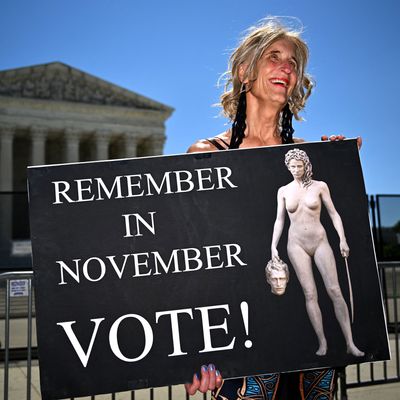
Up until recently, the trajectory of the midterm elections showed a strong and steady Republican advantage until a decisive moment in June, when the Supreme Court’s Dobbs decision abolished the national right to abortion. After that event, which galvanized a pro-choice popular majority in the country and wrong-footed Republicans everywhere, Democrats steadily gained ground. The Republican advantage in the generic congressional ballot (per the RealClearPolitics averages) was cut in half within two weeks of Dobbs coming down, and by early August, Democrats were ahead. Here’s how I described the landscape on August 23:
Prior to Dobbs, measurements of issue saliency heading into the midterms invariably showed an electorate fixated on economic issues, crime, and immigration — topics on which Democrats were quite vulnerable. Now, abortion rights are on more voters’ radar. In July, Gallup reported the largest number of poll respondents citing abortion as the most important problem facing the country since the organization started asking that question in 1984.
There were other factors feeding Democratic prospects in the late summer, including a drop in gasoline prices, some hopeful economic signs, and congressional enactment of the Inflation Reduction Act. But the Dobbs backlash appeared to be the biggest driver of a trend that for a hot minute looked likely to produce very rare midterm gains for the president’s party, despite meh job-approval ratings for Joe Biden himself. Among other things, preoccupation with the threat to abortion rights appeared to be stimulating a boom in voter registration by women and creating an environment when young voters might turn out in numbers rivaling their outstanding participation rates of 2018 and 2020.
Now Republican optimism has returned as public concerns about the economy have eclipsed fears about abortion rights (not to mention another issue favoring Democrats, gun violence) decisively. The latest New York Times/Siena poll reflects this renewed reality:
With inflation unrelenting and the stock market steadily on the decline, the share of likely voters who said economic concerns were the most important issues facing America has leaped since July, to 44 percent from 36 percent — far higher than any other issue. And voters most concerned with the economy favored Republicans overwhelmingly, by more than a two-to-one margin …
While the share of voters focused on guns declined, those who identified abortion as the top issue remained flat, at 5 percent.
CNN’s polling director has observed similar trends in multiple surveys:
Widespread impressions of the economy as bad and worsening, combined with dissatisfaction with President Joe Biden and the way things are going in the country, suggest that the nation’s overall political mood — which had been somewhat more favorable for Democrats following the Supreme Court’s overturning of Roe v. Wade – may be tilting more in Republicans’ favor …
A CNN poll released last week found that 9 in 10 registered voters called the economy important to their vote, while 72% rated abortion as that important. Those registered voters who consider the economy extremely important to their vote break sharply toward the Republican in their districts, 53% to 38%.
While perceptions that the economy is getting steadily worse are at the heart of the evolving issue landscape, it’s likely as well that Republican prevarication and soft-pedaling of the abortion issue has undermined the Dobbs backlash. In immediate wake of Dobbs, the news was full of indicators of Republican excitement about the new opportunity they enjoyed to ban abortions at the state and potentially the federal level.
But the Dobbs backlash, exemplified by the overwhelming defeat of an anti-abortion ballot initiative in Kansas, has put Republicans very much on the defensive. When Senator Lindsey Graham introduced legislation to ban abortions nationally after 15 weeks of pregnancy — a standard far less draconian than many states were imposing — his colleagues mostly grumbled that he was undercutting a partywide effort to downplay the abortion issue and revive fears a Republican Congress might overrule state decisions to protect abortion rights. On the campaign trail, Republican candidates like Arizona Senate nominee Blake Masters scrubbed their websites to expunge radical anti-abortion positions. To the extent they even talked about the issue, Republicans tried to shift the discussion to alleged
Democratic abortion-on-demand extremism instead of their own endlessly documented records of opposing legalized abortion. It’s going to the point where recently exultant anti-abortion activists are whining that the GOP is abandoning their cause.
You don’t have to accept this new GOP reticence on abortion as authentic, or minimize the damage to reproductive rights their lawmakers have already wrought, to recognize the potential effect of this effort to tamp down the salience of this issue. Fears that the Dobbs backlash is ebbing explain Biden’s decision to announce that federal legislation codifying Roe v. Wade will be his top priority next year if Democrats hang onto control of Congress. (In reality that’s very unlikely, since it would require not only a Democratic House but enough Democratic senators willing to abolish the filibuster to overcome the resistance of Joe Manchin and Kyrsten Sinema to that reform.) But by putting abortion rights on the front burner for Democrats nationally, Biden is trying to raise the salience of the issue for midterm voters — especially the women who appear to be drifting toward the GOP in the latest polling, as the Times noted from its own survey:
The biggest shift came from women who identified as independent voters. In September, they favored Democrats by 14 points. Now, independent women backed Republicans by 18 points — a striking swing given the polarization of the American electorate and how intensely Democrats have focused on that group and on the threat Republicans pose to abortion rights.
Pro-choice voters in states holding ballot tests on abortion policy next month (California, Kentucky, Michigan, Montana, and Vermont) may not need reminders that their rights are on the ballot. Elsewhere, it cannot be stressed by Democrats too much.






























